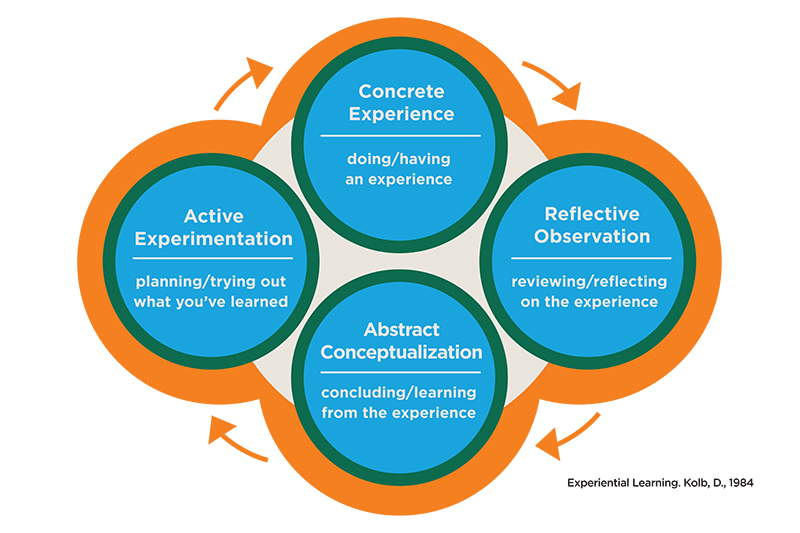Experiential Learning
Experiential Learning (Kolb, 1984) is a course design framework that:
- Is a holistic approach which emphasizes the critical role of experience
- Promotes learning through experience and discovery (an on-going process)
- Learning occurs from experience (doing)
- A cyclical process of creating knowledge (personal and social)
- Requires resolution for learning to occur via adaptation
- Students experience, reflect, generalize, and test (Cowan 1998)
- "Learning is the process whereby knowledge is created through the transformation of
experience," (Kolb, 1984, p.38)
- "..a process in which experience is reflected upon and then translated into concepts which in turn become guidelines for new experiences," (Saddington, 1992, p 44)
Design Framework
Experiential Learning Framework is designed in an on-going cyclical process. Each cycle consists of:
Concrete Experience
- Purposeful and active to provide a common experience on which to build learning
- Examples include: readings, examples/demonstrations, brief research projects, fieldwork, laboratories, basic experiments, film clips, problems/scenarios, observations, simulations, games, small group discussions, photographs/images, debates, practical exercises, creative exercises, etc.
Reflective Observation
- Using questioning and/or group discussions
- Examples include: blogs, diaries, peer analysis and feedback, critiques, short reports, event summaries, journaling, brainstorming, rhetorical questioning
Abstract Conceptualization
- Interpreting events and identifying key relationships
- Comparisons between the original experience and what has been learned since
- Examples include: projects, analogies, model creation/construction, theory propositions, concept mapping, summaries, sequencing facts/events, framing and explaining events
Active Experimentation
- Implementing what they have learned
- Planning suggests anticipated outcomes (predictions)
- Refinement and revision within specific context(s)
- Examples include: case studies, role play, authentic games, problem solving, laboratories, fieldwork, simulations, authentic applications

Key Design Principles
- Identifying meaningful concrete experiences
- This may be different for EACH student (although similar in topic/focus) depending on development
- Stimulates further inquiry, thought, and analysis
- Identify how skills, concepts, and knowledge would be applied
- Reflection questions need to be thoughtfully constructed to lead to thoughtfully constructed
concepts
- Questions should be:
- Broad (open ended, variety of responses and perspectives, seeks possibilities)
- Specific (examples, alternatives, linked to experience, if-then, seek justification and clarification)
- Engage all students
- Seek to determine changes in comprehension
- Both individual and group oriented
- Consider alternatives to verbal interactions (written, diagramed, anonymous, electronic formats, etc.)
- Questions should be:
- Conceptualization provides guidelines and frameworks for future experimentation
- Assimilation and synthesis of theories, facts, perspectives, etc.
- Create new perspectives, possibilities, and what ifs
- Experimentation further refines conceptualization and enables more accurate prediction
of future outcomes
- Testing of the newly developed guidelines and frameworks
- Refinement and adaptation of these
Course Design Process
- Identify the threshold concepts skills, knowledge for the course.
- Determine assessment strategies
- Review the Experiential Learning cycle
- Determine readings, activities, and experiences that will help students attain threshold concepts, skills, and knowledge
Design Resources
- Experiential Learning - UT Austin
- Experiential Learning - Northern Illinois University
- Facilitating Reflection - University of Vermont
- Learning Together - Loyola University
- Levett-Jones, T. (2007). Facilitating reflective practice & self-assessment of competence through the use of narratives. Nurse Education in Practice, 7(2), 112-119
- Reflection - Indiana Univervisty, Purdue University - Fort Wayne
- Reflection Facilitation Manual - Elon University
- Self-Authored Integrated Learning (SAIL) - Northeastern University
- Tsingos, C., Bosnic-Anticevich, S. & Smith, L. (2014). Reflective practice & its implications for pharmacy education. American Journal of Pharmaceutical Education, 78(1): 18
References
- Cowan, J. 1998. On becoming an innovative university teacher: Reflection in action. Milton Keynes, UK: Open University
- Kolb, D. A., Rubin I. M., & McIntyre, J. (1971). Organizational psychology: An experiential approach. Englewood Cliffs, NJ: Prentice Hall
- Kolb, D. A. (1984). Experiential learning: Experience as the source of learning and development. Englewood Cliffs, NJ: Prentice-Hall
- Saddington, J. A. (1992). Learner experience: A rich resource for learning. In J. Mulligan and C. Griffin (Eds.), Empowerment through experiential learning: Explorations of good practice, (pp.37-49). London, UK: Kogan Page
